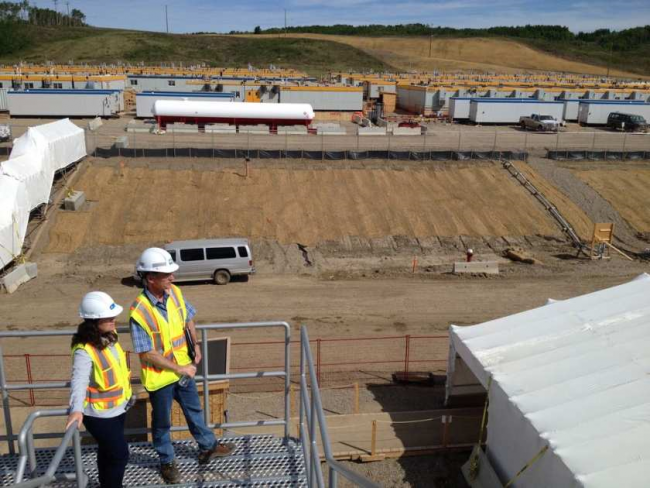Articles Menu

VICTORIA, June 27 — For all of Premier Christy Clark’s vow to advance the Site C project past the point of no return before the election, the New Democrats maintain they would subject the $9 billion B.C. Hydro project to independent review before deciding whether to let it proceed to completion.
“We have to act in the public interest,” says Adrian Dix, the Opposition critic for Hydro, responding to questions about how an NDP government would handle the hydroelectric dam now under construction at Site C on the Peace River.
“We’re going to be facing $3b to $4b in contracts now, another billion coming,” Dix conceded during an interview with me last week on Voice of B.C. on Shaw TV. “We’re also faced with contracts we haven’t seen.”
As well as scrutinizing fine print on the contracts, the New Democrats would send the project to review by the independent B.C. Utilities Commission, something the B.C. Liberals blocked with legislation.
“We’re going to look, see what the situation is, and act accordingly and, I think, unlike the Liberals who decided intentionally not to find that out — they didn’t go to the independent regulator. They intentionally tried not to find that out. We need, I think, some independent advice.”
Dix was echoing what his successor as party leader, John Horgan, said in answer to similar questions about Site C earlier this month.
“Well, we haven’t seen the contracts,” Horgan told me. “We won’t see the contracts until we form a government.”
But knowing what he knows now, would he kill Site C?
“Well, we’ll see,” the Opposition leader replied. “We’re a long way from that. I can’t say. What troubles me is the premier is making this a wedge issue when it’s billions of our dollars. It has massive consequences to the land, to our hydro utility. We don’t have a market for the power. And it strikes me that that’s bad policy, it’s bad government, and it’s also bad politics. So we’ll see what it looks like when I get there, but we’re a long way from finishing that (campaign.)”
Back to Dix. During the course of the interview, he offered a lengthy critique of the economics of Site C, insisting the power is not needed and even if it were, there are cheaper alternatives.
“You ask people if they support Site C, as B.C. Hydro recently did, to meet B.C.’s growing electricity demand — well, BC’s electricity demand has been flat for 10 years, and now it’s going down,” Dix said.
“We won’t need Site C’s power for a long time after it comes into service (in 2024). It’ll have to be sold outside of B.C. for what we can get for it, and that means billions of dollars in losses. Secondly, since they announced Site C, the price of renewables as competitive choices that B.C. Hydro could have made has dropped precipitously.”
As Dix sees it, by opting for the backdated technology of a hydroelectric dam over state-of-the-art renewables, Premier Clark is in effect locking B.C. into “a 70-year contract for a flip phone.”
He ventured a no less vivid response to Clark’s vow, voiced at the memorial service for former premier Bill Bennett in January, to get Site C “to the point of no return” before the election.
“I think when Christy Clark says, ‘past the point of no return,’ the ratepayers of B.C. Hydro must feel like Wile E. Coyote who’s just gone over the cliff,” Dix told me. If you recall the Warner Brothers cartoons, when the hapless coyote would run off the edge of a cliff in his pursuit of the roadrunner, so long as he didn’t look down, he wouldn’t plummet to the bottom of the canyon.
Another question mark noted by Dix involves the legal challenges to Site C mounted by First Nations in the Peace River region. Though B.C. Hydro won several preliminary rounds, the latest case is scheduled to be taken up by the Federal Court of Appeal in September. Eventually, the matter will likely end up on the docket of the Supreme Court of Canada.
The NDP critic continued to express skepticism about B.C. Hydro’s cost estimating on Site C, currently just short of $9 billion including interest, inflation and contingencies.
By way of a followup, on Friday Dix sent me the latest news regarding Site C’s east coast counterpart, the Muskrat Falls hydro project, mounted by Nalcor Energy, B.C. Hydro’s provincial government-owned counterpart in Newfoundland and Labrador.
Some $4 billion over budget and two years behind schedule, power rates slated to almost double once construction and carrying costs are factored in.
“It was a gamble and it has gone against us,” Nalcor CEO Stan Marshall told reporters in St. John’s Friday. “Muskrat Falls was not the right choice for the power needs of this province.”
Or, as the headline on the filing from CBC News put it: “It’s official: Muskrat Falls a boondoggle.”
Dix has bad memories of such headlines, having served as chief of staff in the 1990s to then Premier Glen Clark, whose dubious ventures gave rise to what were known as “Glendoggles.”
Should Horgan, Dix and crew find their way back into power next year, they will no doubt take aim at Site C with a view to bringing the “doggle” suffix out of retirement and attaching it firmly to the legacy of Christy Clark.
Above photo: Larry Pynn / PNG